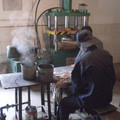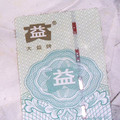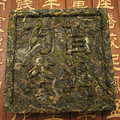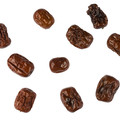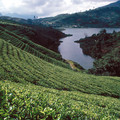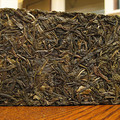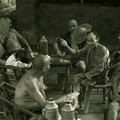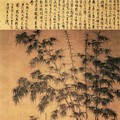Pu-erh tea
„Ripened or aged raw pu-erh has occasionally been mistakenly categorised as a subcategory of black tea due to the dark red colour of its leaves and liquor. However, pu-erh in both its ripened and aged forms has undergone secondary oxidization and fermentation caused both by organisms growing in the tea and free-radical oxidation, thus making it a unique type of tea. This divergence in production style not only makes the flavour and texture of pu-erh tea different but also results in a rather different chemical makeup to resulting brewed liquor.“
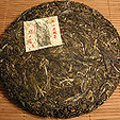
Quotes Tags: Pu-erh, Tea oxidation, Sheng - Raw Puerh, Shu - Ripe Puerh
- Discussion: 0 comments
- Write a comment
Teas - Pu-erh
2010 Yunnan Yin Hao Xiao Yuan Cha- Raw
 0 reviews
0 reviewsThis nice small cake is made from early spring Wuliangshan and Lincang material. Many...
2015 Quanjihao Manzhuan Raw Puerh Tea
 0 reviews
0 reviewsEstablished in the Qing Dynasty and passed down for thirteen generations, Quanjihao...
2007 Longyu Brand Bulangshan Jin Cha Ripe
 1 review
1 reviewJin Cha(mushroom) is especially for Tibetan market, used to be mixed with milk, it is...
2015 Chawangpu Bada Old Tree Xiao Bing
 1 review
1 reviewSince 2012, Bada mountain is one of our personal favorite place and we spend many days...
2001 CNNP Private Order 7542 Raw Puerh
 0 reviews
0 reviewsThis is a good example of CNNP "7542" production. This custom-made "7542" cake was...
2013 Spring Hekai Gu Shu Mao Cha
 1 review
1 reviewThe mao cha were picked on the same day from the same tea garden. Light yellow liquor...
Quotes - Pu-erh
„In 1940, the Chinese State owned company CNNP started to manufacture Pu Erh Tea with a trademark "Zhong-Cha" at the Fo-Hai Tea Factory (now called "Meng-Hai Tea Factory"). Later, Yun-Nan Tea Company and Guang-Dong Tea Company also produced the same brand and started to export abroad. There were varieties such as red-label, green-label, yellow-label, small-letter and big-letter etc.“

Quotes Tags: Pu-erh, Tea production, China
Video - Pu-erh
Theme
Teas
2012 Menghai "Spring of Menghai" Raw Pu-erh
 1 review
1 reviewPremium blend of first flush of spring tea * Batch 201This is a newer Menghai release, first...
2003 CNNP "Yi Wu Old Tree Round Cake" Raw
 1 review
1 reviewProbably a small tea factory in Yi Wu area pressed this cake under the "zhong cha" label in 2003. Entirely...
SeJak 2014 ECO Korea
 1 review
1 reviewKorean green tea picked in the spring of 2014 in Hadong district, Jiri mountains. Grown and produced by an...
Tea by region
We will help you with tea selection.
Do you like quality loose tea?
We will help you to find the right one for you. Be inspired by tea ratings of other tea lovers. Rating stars could help you.


Review your cup of tea.
Review the tea you are drinking and help other tea lovers to find the right cup of tea.






 Shops
Shops Share on Facebook
Share on Facebook







